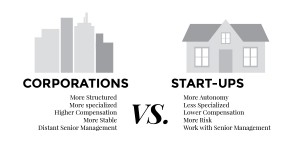Internships, once deemed optional, are now seemingly a necessity. This year alone, internship hiring in the Northeast is expected to increase by 10 percent, and national co-op hiring is expected to increase by 4.4 percent, according to the 2014 Internship and Co-op Survey by the National Association of Colleges and Employers. The question no longer concerns whether or not to take an internship, but rather, what type of internship to take.
Changes in the Boston economy have resulted in changes in the types of internships available to students. Though large corporations such as Deloitte and PricewaterhouseCoopers continue to attract student applicants, many students are considering an alternative: startup internships.

Robby Bitting, marketing director at startup accelerator MassChallenge, said the burgeoning Boston startup scene and the large student population in Boston supplement each other.
“I think entrepreneurs rely on the students in Boston because they’re so smart, they’re really skilled and they’re looking for experiences,” he said. “And entrepreneurs desperately need smart, talented, people, but also people who are hungry. And students are some of the people most eager for those experiences, so it’s a really nice relationship there.
“The nature of startups is that they are constantly evolving and having that constantly evolving student population. They turn over every four years. You get new batch of freshman in every year, [and] people are coming in from all over the place. That sort of movement really complements how entrepreneurs build their businesses as well.”
Kanav Dhir, a College of Engineering senior, said he founded the Boston University Startup Fair after noticing the strong demand for startup internships at BU.
“Me and a good friend of mine were at the College of Engineering Career Fair and noticed that Formlabs and a couple of other startups happened to be there, and we noticed the lines for those startups were almost out the door,” he said. “It took us a month, and we put together companies, and 350 students showed up, and a lot of students also received offers.”
Dhir began working with startups at BU during his freshman year when ByteLight, an LED-based indoor positioning technology company founded by BU alumni, caught his attention.
As a ByteLight intern, Dhir found himself performing a wide variety of tasks. He played a part in fundraising, creating marketing materials, dealing with patent-related issues and sitting in on meetings about funding or product development.
“We all sat together, so it really exposed me to all the different areas involved in starting a company,” he said. “Not just the engineering part of it, which is initially what I was interested in, and what I applied for…it’s just I was part of a team, and they treated me like I was part of a team, so all the conversations were as they would have with any other member. It was such a great experience because everything that was happening, I was absorbing it.”
Sua Morales, a 2014 College of Communication graduate, worked with four startups, both in intern and full-time capacities.
“Lack of structure is one thing I realized I always kind of liked because it makes building something much easier; you don’t have to ask for permission,” she said. “At every single startup, if I had an idea, I could implement it.”
The structure of larger companies makes it more difficult to work closely with the management team or be involved in decision-making processes, Dhir said.
At Dow Jones, where Morales served as a research analyst intern in 2013, an established infrastructure was already in place, and there was little room for malleability.
“Rigid is a good word to describe it. It was very stuffy,” she said. “People came in at nine or 10, and they wrapped at five or six.”
Barron Roth, ENG junior, noted the inflexibility at his co-op with Advanced Micro Devices, a technology company.
“That part about working in such a large corporation is you are stuck in a cubicle, you have deadlines, you have an incredible amount of data you have to analyze, and you’re sort of a drone,” he said. “There’s a rigid structure to your job as an engineer. There’s little room for creativity, unfortunately. But you’re a scientist. You’re trying to do the best engineering work you could possibly do, and at the end of the day, you know what you have to do to get it done.”
However, there are merits to the structured approach corporations take. Because of the consistency, there is less ambiguity and less inherent risk.
Mariya Chulichkova, COM senior, said she preferred the clarity a larger company provides in contrast to her experiences with the less structured environment at Neurala, a Cambridge-based robotics software startup.
“My other company was a BU office, so everything is very established,” she said. “They know exactly what they need to do. You need to go through several people. The previous TV station I’ve worked for was also very structured.”
Nikita Bhatia, ENG freshman, said as an intern at the emerging Myos Corporation, she noticed an increase in company credibility and efficiency following their July listing on Nasdaq.
“There was a lot more going on in Myos after the company went public,” she said.
With structure also comes higher compensation. In the great unpaid versus paid internship debate, corporate internships would emerge victorious. But despite the lucrative appeal that lies in corporate internships, some students are willing to forgo that for the experience startup internships provide.
Leah Robson, a College of Arts and Sciences senior, said the culture at Splashcore, a MassChallenge and Techstars startup, drew her to the company.
“It’s a small, young company and they put high priority on making it a good place,” she said. “They have incorporated a lot of things to the culture. Every Tuesday, the whole team gets together, and we spend a couple hours problem-solving as a whole team and drinking beer. And after work today, the whole team is going to go bowling. They incorporate some things like that to keep the team collaboration consistent.”
However, it is not all play at startups. Entrepreneurs are notorious for working lengthy hours and because of that manic drive to excel, startups cultivate a meritocratic system.
While working with the Luxe St. app, Roth said he was driven to execute well.
“They gave me an incredible amount of responsibility…I just wanted to do the best work I could possibly do,” he said. “But at the end of the day, you do what you can to add to the company, and I did a lot, from building the website to doing social media marketing to the actual implementation of the application. At a startup, you are definitely a jack-of-all-trades. Everyone’s a jack-of-all-trades. You add value more than just your title.”
With the lure of startup internships becoming harder to resist for many students and recent graduates, startup accelerators and incubators such as MassChallenge and Techstars are taking initiatives to increase marketing to students and recent graduates.
MassChallenge has just launched a “job board,” filled with job offers for interns and full-time employees alike in a variety of different career paths. Bitting said there are already 60 jobs posted on the board.
Similarly, Techstars has a job board that enables job seekers to access a 3,000-member network of founders, alumni and mentors, said Sonya Caprio, vice president of marketing at Techstars.
For students seeking to optimally prepare themselves for their post-college careers, Bitting recommends exploring both corporate and startup internships.
“A question I get a lot from students is, ‘If I’m looking to get an internship, which one should I do first?’ I think there [are] benefits to doing either first,” he said. “I personally started with the corporate background first, and that helped me think about structure before I joined the startup environment, which has helped me a lot.
“The value of starting at a startup first is that sort of self-starting mentality that often will be a huge advantage and the ability to supplement the structure provided by a corporation with that sort of self-motivated hunger. It’s where the magic can happen.”




